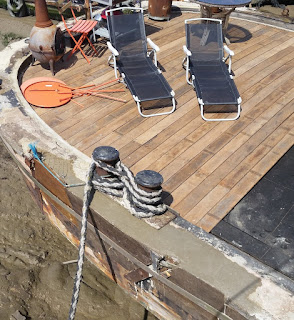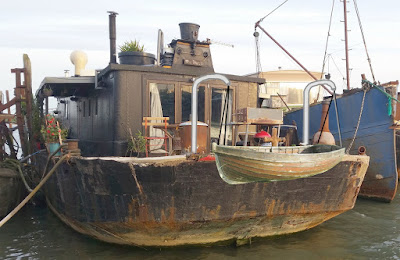A few historical items found along the way. The first is an
advertisement for a revolving ‘lanthorn’ (Photo 981). Yes I wondered at this, but it is the archaic
version of ‘lantern’. The translucent sides of early lanterns were made of very
thin horn, not glass, and hence ‘lanthorn’. Anyway, a Captain H.G. Pearce
invented this device “to prevent those
serious and Melancholy Accidents which so frequently occur from Vessels running
foul of each other at Night”.
Full marks for
initiative but it would rely on all Masters knowing the colour codes and
understanding (as I suppose they must) the nautical terms which puzzle me –
‘Larbourd’, ‘keep her Luff’, ‘Upon a wind’ etc. I don’t suppose this idea was ever taken up.
Why buy an expensive bit of kit if you cannot guarantee everyone else is going
to have the same?
The second
historical item is a set of instructions to help you operate a ‘Manual Fog
Signal Apparatus’ should you ever come across one (Photo 982). These instructions were issued by Trinity
House in 1895. My copy is rather tatty
and so I have re-typed the instructions. They are, in my eyes at least, a bit
pedantic, but I suppose there was little chance of a help-line phone call, or a
home visit when things went wrong! They
had to cover every eventuality.
The last sentence
of the first paragraph conjures up a sense of mounting panic as the horn is
sounded more and more frequently until it is emitting a continuous scream.
Better that than a collision I suppose!
Coming more up to
date (1960s), I found this short item about pirate radio stations –
The Suppression of the broadcasts
by stations outside national territories. - National legislation and European
Agreement. 1966
Great
Britain OK has a radius of action covering the French and British coasts. It
emits a wavelength already in use by stations in Stockholm, Spain and the
Soviet Union. The station is installed on a vessel, the 'Lady Dixon', off the
coast in the mouth of the River Thames.
In
fact Great Britain OK (GBOK) never did get to the proposed mooring ‘off the
coast in the mouth of the River Thames’ and indeed never did broadcast. It is
believed that in July 1962 the ship, while in Sheerness awaiting a tow out to
her station, was raided by the Post Office and the radio equipment confiscated.
British youth, or at least those in SE England, had to wait for Radio Caroline
to make it in 1964.
Meanwhile, back
on the ship …. Simon has completed the
first stage of the repairs to the stern gunwale. The last section on the starboard side was
the worst and did look pretty grim (Photo 983).
Five bags of
sand and two of cement later and the whole area looks much better (Photo 984).
To finish off, the shuttering has to come off
and all the repaired areas need sealing and painting. Then he will have to find
a good joiner to design, make and fit the bench seating he has in mind. The
seats will be weather-proof lockers in which to store cushions etc., and, as I
reported before, there will be a door in the centre to give access to the
clinker boat he plans to have hanging out there – if he can find some davits! My ‘artist’s impression’ shows the idea
(Photo 985).
David





No comments:
Post a Comment